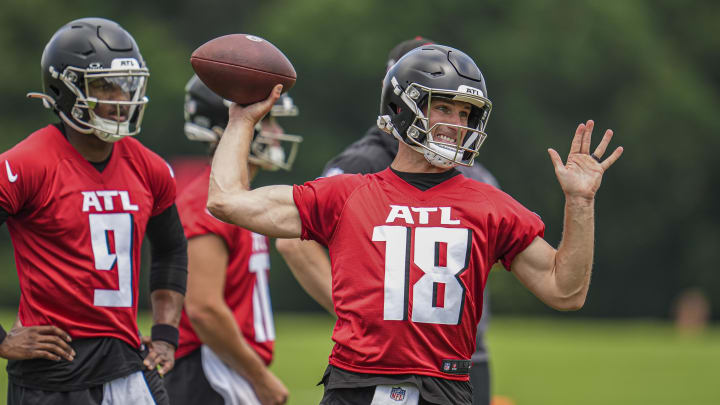How Falcons QBs Kirk Cousins, Michael Penix Jr. Are Similar

FLOWERY BRANCH, Ga. -- On the surface, the two quarterbacks at the center of the Atlanta Falcons' offseason have little in common.
Kirk Cousins and Michael Penix Jr. are from different parts of the country. Cousins hails from the Midwest in Barrington, Ill., while Penix is from Tampa, Fla., some 1,200 miles south of Cousins's roots.
Cousins throws right-handed; Penix left. Cousins is married with two kids; Penix has no such ties. Cousins has 12 years of NFL experience and four Pro Bowl appearances to his name; Penix is entering his rookie season.
Falcons tight end Kyle Pitts added a few more.
"They are two different people," Pitts said. "Kirk is 35, Mike is 24. So, they're different people, different playing styles. One's younger. I'm sure it will change, but we're not getting into comparing the two because I really can't."
But dig a little deeper, and there's more than meets the eye between the two.
Cousins was heavily underrecruited out of high school; he had only five Division I offers, according to 247sports, and arrived at Michigan State University at the very bottom of the depth chart.
Yet in an era of college football where transferring had much more severe consequences than it does now, Cousins persevered at Michigan State and ultimately became the starter as a redshirt sophomore.
Penix's path was different. He started at Indiana University as a redshirt freshman, becoming the first freshman to start the season opener in 21 years.
But Penix battled injuries in each of his four seasons with the Hoosiers. A change of scenery proved necessary, so he transferred to the University of Washington - where he starred, finishing as the Heisman runner-up in 2023.
On draft weekend, Cousins slid to the fourth round in 2012, when he was selected by the now-Washington Commanders to be Robert Griffin III's backup. Penix, meanwhile, went No. 8 overall this April - and now finds himself as Cousins's backup.
But it's within the fine print - the adversity, the question marks and everything in between - that Falcons head coach Raheem Morris believes unites his two popular passers.
"Two guys that have been second-guessed, doubted, always proving people wrong," Morris said. "Kirk is no different with that story and Michael Penix's story sounds very similar. There's something about people that can go through adversity, who can handle adversity and who can literally bounce back from all different types of walks of life and be here."
Here, in this case, is IBM Performance Field, where the Falcons hold their practices. This is also where the biggest similarities between Cousins and Penix arise.
When the Falcons signed Cousins, Morris rattled off a number of reasons why, from his leadership and intelligence to his competitive fire. When Atlanta's decision makers watched film on Penix, they saw much the same, headlined by a live arm and budding durability.
As such, when asked why the Falcons believe in Penix as a long-term answer after Cousins, Morris's answer was simple.
"Really, it’s a lot of the same similar traits that we talked about when went out and got Kirk," Morris said. "You're talking about a guy who is a pocket passer, who can progress really well, who can do all the things you want him to do, throw the ball all over the field."
The 6-3, 205-pound Cousins and 6-3, 215-pound Penix also share similar frames, and how they use their bodies leads to another group of similarities.
While perhaps more subtle, Falcons quarterback coach T.J. Yates, who saw the two each day during OTAs and minicamp, feels there are plenty of traits in common, particularly within offensive coordinator Zac Robinson's scheme.
"People might view them as different players on the outside," Yates said, "but for our offense and how we want to do things here - they both extend plays from inside the pocket with their vision, with their anticipation, the field and the ability to make those subtle movements in the pocket and still deliver the ball downfield while keeping your eyes up."
The Falcons' plan is for Cousins to be the present solution for as long as he's viable - he signed a four-year, $180-million contract in March - and for Penix to take over thereafter.
In the meantime, Penix will be watching Cousins from the sideline - hoping one day to translate their stylistic similarities to a career that resembles that of his veteran counterpart in terms of longevity and accolades.
"Super blessed to be right here in this position with a veteran in front of me," Penix said. "Just learning from him and going about my business each and every day trying to find ways to improve and get to where he is.
"Multiple years in the league - that's what I want."
